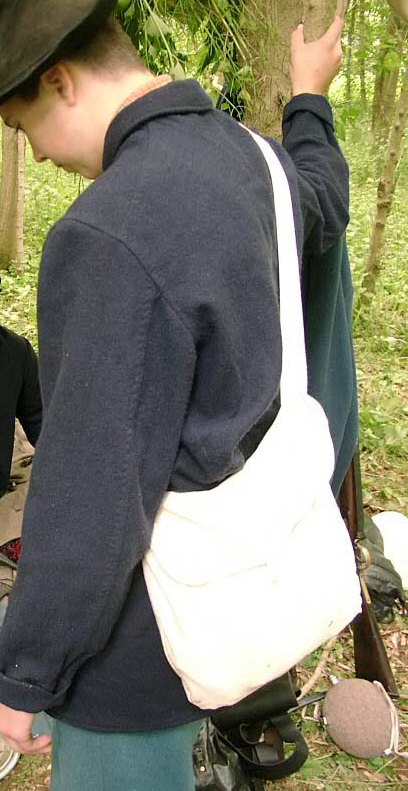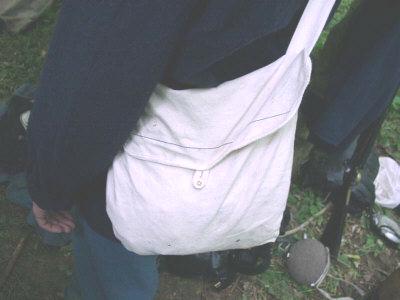|
The following is a quote regarding white Federal issue
haversacks from:
Corporal Si Klegg and His "Pard": How
they lived and talked, and what they did and suffered, while fighting
for the Flag.
by Wilbur F. Hinman, late Lieutenant-Colonel Sixty-Fifth
Regiment, Ohio Volunteer Infantry. N.G.Hamilton & Co. Cleveland, Ohio
1889
 "Another
detail returned from a visit to the quartermaster, and the orderly
began to hand around to each man a white canvas bag that would hold
about a peck, with a strap attached to opposite sides. " "Another
detail returned from a visit to the quartermaster, and the orderly
began to hand around to each man a white canvas bag that would hold
about a peck, with a strap attached to opposite sides. "
"What's this?" asked Si of his new acquaintance, who was standing
near as one of the bags was giving to him.
"That's yer haversack!"
"But what's it fer?"
"Ter carry yer grub in!" replied Shorty. "If ye've got's
good a appetite's I think ye hev f'm yer looks, ye can't git 'long 'thout
that nohow. Ye may see the time 't ye'll wish ye had more to put in
it; but jest let me tell ye ter hang onter yer haversack through thick
'n' thin. It'll be the best friend ye'll find in the army."
"Si
readily conceded with his comrade's views concerning its value, and
inwardly resolved that whatever might betide, he would stick to his
haversack, and defend it with his life. He thought it was very nice,
it looked so white and clean."
"There
were haversacks-and haversacks. Theoretically, they were all
water-proof but practically they were quite the reverse, particularly
after they had become a little worn. A penetrating rain storm was
very likely to make a sorry mess of their contents. Some of them were
black and some of them were white-that is to say, they were white when
new. By the time one of these had been in use for a few weeks as a
receptacle for chunks of fat bacon and fresh meat, damp sugar tied in
a rag-perhaps a piece of an old shirt- potatoes and other vegetables
that might be picked up along the route, it took on the color of a
printing office towel. It would have been alike offensive to the eyes
and nose of a fastidious person. Very likely he would have gone
hungry for a good while before he could bring himself to eat anything
out of it. But the educated taste of the soldier disdained all such
squeamishness. When his regiment halted he would drop by the
roadside, draw his grimy and well-greased haversack around in front of
him, and from its dark and odorous recesses bring forth what tasted
better to him than the daintiest morsel to the palate of an epicure.
It was all in getting used to such things."
 "If
at this time one of the war-worn haversacks that went through "to the
Sea" had been laid before Si Klegg at dinner time, he would have
placed his fingers to his nose and turned away in dire disgust,
saying: "Is thy servant a dog that he should do this thing?" It would
be all right after a while, but he would have to come to it
gradually. "Rome was not built in a day;" no more did a soldier learn
in that limited time to eat a campaign meal out of one of those
fearful haversacks and be thankful. Sometimes a stray recruit joined a
veteran company. His hands were white, his face clean, and his
appetite had been pampered by home diet. For a time he was altogether
too "nice" and particular, and the old soldier treated with withering
scorn such symptoms of effeminacy." "If
at this time one of the war-worn haversacks that went through "to the
Sea" had been laid before Si Klegg at dinner time, he would have
placed his fingers to his nose and turned away in dire disgust,
saying: "Is thy servant a dog that he should do this thing?" It would
be all right after a while, but he would have to come to it
gradually. "Rome was not built in a day;" no more did a soldier learn
in that limited time to eat a campaign meal out of one of those
fearful haversacks and be thankful. Sometimes a stray recruit joined a
veteran company. His hands were white, his face clean, and his
appetite had been pampered by home diet. For a time he was altogether
too "nice" and particular, and the old soldier treated with withering
scorn such symptoms of effeminacy."
"Now
and then, in a spasm of reform, a man would try to wash his haversack,
but the laundry facilities of the army were sadly defective, and only
indifferent results were attained. The original whiteness of that
haversack was gone forever. If it showed an improved appearance, it
was but brief and delusive. It was soon blacker than before, and the
last state of that haversack was worse than the first." |



